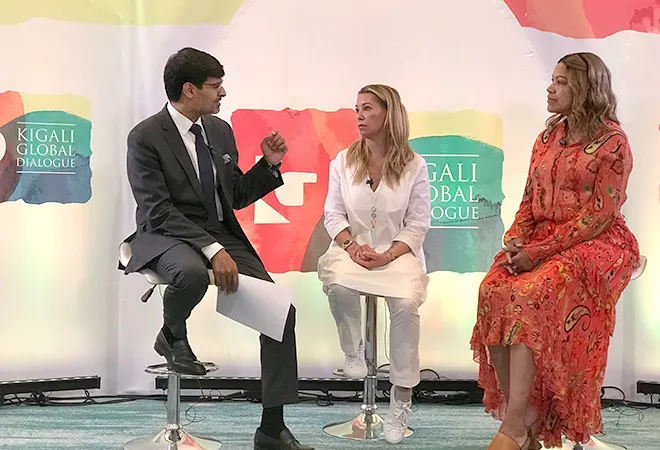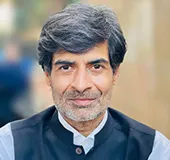
Two coffee entrepreneurs and trailblazers Daria Illy and Grace Hightower are making a powerful case that the time is ripe for unleashing woman power across coffee farms and their legacy ownership patterns. They say men are listening intently and even walking alongside women in a global effort towards getting women out of the old “traps” and boundaries that limit them from early in their lives. Illy and Hightower share their thoughts in a 30 minute conversation with Samir Saran, President, Observer Research Foundation, on the sidelines of the Kigali Global Dialogue in Kigali, the capital city of Rwanda. Illy and Hightower both have great expectations from Rwandan coffee and the country’s people and are sourcing a good chunk of coffee beans from here after having been touched by the country’s swift rise and its big dreams. From their favourite cup of coffee — “Rwandan, of course!” — to the mechanisms for women to hold their own in an increasingly “alpha” world, highlights from this “Unleashing Half the Sky” Q&A are below.
Samir Saran: When it comes down to achieving women’s leadership in the 20th century, what are the nuts and bolts we need to start working on? What does it take to drive women leadership which can create prosperity?
Daria Illy: I had a magnet on my fridge when I was a little girl and it said: “To teach is to touch a life forever.” The biggest change I have seen happening is when someone learns something new and they apply it. So, I think that real sharing, being in professional locations with the people — that’s a positive circle. Part of the change is absolutely culture.
The biggest change I have seen happening is when someone learns something new and they apply it. So, I think that real sharing, being in professional locations with the people — that’s a positive circle. Part of the change is absolutely culture.
Saran: Today teaching and learning is through personal contact — going to the field, going to the farms. There is also technology. Are we seeing technology as a catalyst for women’s learning and empowerment, giving them dreams?
Illy: We have platforms we use to diffuse the message globally. So absolutely, this helps very much. First, it helps us broaden what we are seeing. The University of Coffee has 27 seats in 27 parts of the world. We do what we can to refresh the training. We work on the web platform. It gives consistency to what we are spreading. Also, you can reach many more people. Education changes the equation but they need to get access to it. Access to education happens through positive and fortunate interaction. So, we need to reach out to them and help them grow more and more. The “we” includes foundations, institutions and governments.
Saran: What’s the ‘Grace formula’ for giving women aspirations and higher wages?
Hightower: I don’t empower women. I try and help them reveal the power that’s already there. When I heard President Kagame speak — he inspired me so much with his speaking about how the people of Rwanda wanted to be entrepreneurs. They didn’t want handouts. They wanted to create by themselves. I happened to fall into the business of coffee when I was looking for ways to make a contribution here to the people of Rwanda and I found out that coffee is one of the high producing resources. What I’ve seen is that women possess this incredible power and that’s already innately there. Personally, growing up, I knew that power is there. I didn’t know what it was at that time. Unfortunately, we women have been given roles and we fall into that trap of ‘this is what I should be doing.’ We need to take on roles that we did not know how to do — the unknown roles. Those are the ones that lead to creativity and those are the ones that lead to change. I don’t want to say ‘playing’, I want to say ‘doing’. And so, that has enabled me to work here in Rwanda — my second home — and be able to see how the women here and around the world have opened up that power and others are connecting to it. I think the timing is right. Women are very essential in making and creating the changes that are necessary for the campaign of moving forward for all.
Unfortunately, we women have been given roles and we fall into that trap of ‘this is what I should be doing.’ We need to take on roles that we did not know how to do — the unknown roles. Those are the ones that lead to creativity and those are the ones that lead to change.
Saran: I think you raised a very important point — the campaign. That campaign must include men and in this entire effort, are you beginning to see a larger number of men commit their resources and time towards that goal.
Hightower: We do live in a predominantly male dominated world but I find quite a few men who are stopping and listening to what women have to say. They are listening to their ideas. Their ideas are in alignment with what is going on naturally in the world. We cannot remain with the old ideas that were predominantly male and so many of the old ideas are not relevant anymore. I feel that men are becoming more wise and they are actually seeking out women’s ideas. I know that right now most of the companies — the Netflix, the Amazons, the studios are looking for female driven products. They are looking for female stories that are inspiring because they know these stories are real and have impact on our young people. That is going to be the tailgating. Yes, women have stepped into this role for change and men are alongside them.
Saran: Daria, would you like to tell us about your ‘half the cup’ story
Illy: More than half of the coffee is made by women and only 25 per cent are managing farms. The first day of October is International Coffee Day. Every year we celebrate with the #ThankYouForTheCoffee project. Last year, the title for International Coffee Day was ‘Women in Coffee.’ What we wanted to do is bridge the gap between education, consumers and the coffee growers. We designed a cup to have two halves. In all our shops on that day, we were serving half the cup to customers. People looked and said what’s going on? This allowed us to say what we wanted to say. More than 50 per cent of women are involved in this business. When they understand what we’re saying, they get the other half of their coffee!
Saran: The world is becoming more alpha, more insular, there are more strongmen politicians. At this time, we are also awakening to unleash the potential of half of the human population, achieving SDGs. How do you achieve this, how does this mix over a cup of coffee.
Illy: Depends on how alpha we are. The only thing we can do is keep on insisting. There’s a balance happening. We are thinking there might be a moment when some private companies might have to say something. In America, it is happening more and more. It takes a lot of courage. It is something we need to think about the future. Sometimes you manage to stay out but you have your principles, you have to do more.
Depends on how alpha we are. The only thing we can do is keep on insisting.
Hightower: More corporations will have to begin taking a stand and I speak about America. We will have to say what we disagree with and we’re going to have to say we are not going to allow what we think is wrong. I think the people also have to take on another role. Let’s face it, the last four years, we were caught sleeping. I think the awareness has been raised and we have to push the envelope. None of the changes in America would have happened if somebody hadn’t pushed the envelope. Rosa Parks, Gloria Steinem — they all pushed the envelope. It takes courage.
Saran: Finally, share with us one transformational story
Hightower: I came here six years ago and I met with the people of Rwanda. I know you hear this story all the time — you go to Africa and you come back changed but I really did feel a synergy here that I have never felt before. So, when I started the Coffee of Grace company six years ago, I was sourcing from Rwanda, from small farms. I have seen and tasted the transformation. I have seen the product improve so much. The quality is amazing. People in the West are talking about Rwanda coffee now which they weren’t before. I myself did not know Rwanda had coffee before I came here. As women have become more active in co-ops and production, it transfers to many other areas as well. They get together, they talk, they solve problems. For me, that transformation has been enormous. Back in the West, the speciality coffees that these small Rwandan farms produce has become the millennials’ go to coffee!
Transcription and photo by Nikhila Natarajan.
The views expressed above belong to the author(s). ORF research and analyses now available on Telegram! Click here to access our curated content — blogs, longforms and interviews.




 PREV
PREV


